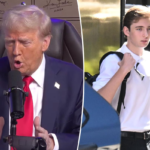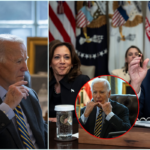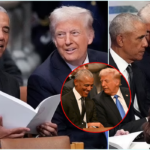Vice President Harris Remains Silent on Controversial Immigration Programs
In a recent press inquiry, Vice President Kamala Harris has refused to clarify her position on two controversial programs implemented under the Biden-Harris Administration that have allowed approximately 1.3 million migrants to enter the United States.
These programs include the CBP One cell phone app and the CHNV (migrant flights parole) program, which combined, permit up to 880,000 migrants to enter the U.S. each month.
Former President Donald Trump commented on the situation during a phone call, stating that if elected, he would immediately terminate both programs and revoke parole grants for migrants who have already entered through these avenues. He expressed his strong opposition, saying, “The app is bad, but what’s worse are the flights. They’re bringing in illegal migrants who shouldn’t be in our country.”
When asked about the future of these programs, Trump had a clear message for the 1.3 million migrants currently paroled in the U.S.: “Get ready to leave, especially quickly if you’re criminals. You’re going out real fast.”
The inquiry to Harris’s campaign specifically sought to determine whether she would maintain Biden’s CBP One app and the migrant flights parole program if she were elected. However, her campaign did not provide a direct answer.
Instead, they issued a statement highlighting her experience as a prosecutor and her support for a bipartisan border security bill, which they claimed was the strongest reform in decades. The statement emphasized that, as president, Harris would sign that bill and advocate for “tough smart solutions” to secure the border and reform the immigration system.
This response has been characterized as a dodge to the specific question about the controversial programs. The bipartisan deal referenced would terminate the use of the CBP One app while maintaining the contentious migrant flights program.
As the debate surrounding immigration policy intensifies, the Harris campaign continues to emphasize broader border security initiatives without addressing the specifics of these contentious programs.
For more updates, stay tuned.





